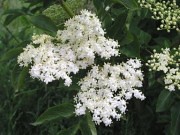 May is traditionally the month for me to make Elderflower Cordial and this year I was determined to make plenty and freeze it but that required an element of forethought. The result is that I bought three packets of citric acid when I was last in England and have kept them safely in the cupboard - there should be enough for next year's cordial as well.
May is traditionally the month for me to make Elderflower Cordial and this year I was determined to make plenty and freeze it but that required an element of forethought. The result is that I bought three packets of citric acid when I was last in England and have kept them safely in the cupboard - there should be enough for next year's cordial as well.The fact is citric acid is not essential but in my opinion it does make for a better result - more bite to the taste. Anyway, I made about six litres and they are safely in the freezer awaiting hot summer days.
I was amused though to see that other English have come up against the problem of obtaining citric acid in France. I honestly had no idea that it was used by drug users until the pharmacist explained - I insisted on an explanation and he was good enough to at least look embarassed when he told me so I am fairly confident he was accusing me of anything; just following the rules - but since then I have heard it from several nursing friends.
So the moral of this story is buy your citric acid in England if you plan on making Elderflower Cordial in France.
My recipe is in fact that of Hugh Fearnley Whittingstall and is as follows:
Ingredients:
20–30 freshly picked heads of elderflower
Zest of two lemons and one orange
Up to 400ml freshly squeezed lemon juice (6–8 lemons, depending on juiciness)
Up to 1.5kg granulated or caster sugar
Tartaric acid (optional)
Shake any insects off the elderflowers, then place them in a large bowl with the lemon and orange zest and pour over enough just-boiled water to cover them completely (about 11/2–2 litres).
Cover and leave for at least 4 hours, or overnight, until cold.
Strain the flowery liquid through muslin, a clean cotton cloth or a jelly bag, gently squeezing it to extract all the juice.
Measure the amount of liquid and pour it into a saucepan.
To every 500ml liquid, add 350g sugar, 50ml lemon juice and a heaped teaspoon of tartaric acid if you are using it.
Heat gently to dissolve the sugar, stirring occasionally.
Bring to a gentle simmer and skim off any scum.
Let the cordial cool, then strain once again through muslin, cotton or a jelly bag.
Pour the cordial through a funnel into clean bottles, filling them to within about 2–3cm of the top.
If you want you can freeze the cordial for later use. If you use plastic bottles, only fill to about 5cms from the top and don't tighten the lid until after the liquid is frozen. Alternatively use ice cubes containers or ice cube bags.


